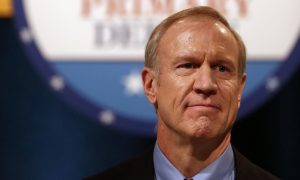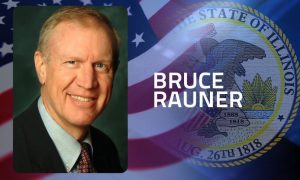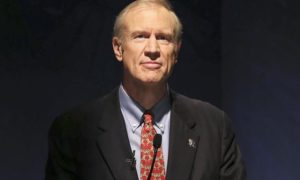Republican Gov. Bruce Rauner and Democratic House Speaker Michael Madigan remained far apart on a new budget Tuesday, unable to even agree on a way forward for negotiations.
The two sides gathered at the Thompson Center following weekend talks, with Madigan emerging from the closed-door huddle to say he proposed restarting so-called working groups of rank-and-file lawmakers to discuss items on Rauner’s legislative wish list.
Rauner’s Republicans said they were not interested in the working group idea, which was attempted earlier this year, and once again accused Democrats of stalling to create a crisis.
The governor kept out of the spotlight, instead issuing a statement that again called on Madigan and Democratic Senate President John Cullerton to approve two of his more controversial legislative proposals: term limits and a permanent property tax freeze for local governments. Rauner has named that as his price for another stopgap spending plan.
Tuesday’s meeting was the continuation of a postelection exercise that began last week when the governor and legislative leaders held meetings at the Capitol as a temporary stopgap spending plan that has kept state services afloat is set to expire at month’s end.
But the Jan. 1 deadline hasn’t caused a sense of urgency among Democrats, the Republicans said.
“No one’s jumping out of their chair to get this done,” House Republican leader Jim Durkin said of the opposition party following the meeting.
Indeed, Madigan downplayed the urgency of the deadline, pointing out that the stopgap spending plan provides a full year of funding for primary and secondary education, as well as capital construction — meaning that some, but not all, of the spending will expire with the new year. At risk is funding for higher education, human services and some government operations, Madigan said.
The speaker, who has been the target of pre- and postelection attacks by the Rauner-led Illinois Republican Party, tried to pin the blame on the governor.
“The truth is, the governor held hostage the budget-making to help his wealthy friends and large corporations,” said Madigan, reviving a theme that he has employed periodically during his nearly two-year budget standoff with Rauner. The speaker was asked repeatedly to explain the accusation but ignored the questions.
Moments later, the Illinois Republican Party blasted out an email that charged, “Mike Madigan says state government is a democracy, but runs it like a dictatorship.” The notion that Madigan, who has been speaker for all but two years since 1983, has the levers of state power in his grip and is the cause of Illinois’ financial woes is something Rauner has pushed.
That the campaign-style rhetoric continues less than a month after Election Day is a sign of the political stickiness of the situation.
At the center of the budget fight is the reality that Illinois is spending far more than it brings in. Much of that overspending occurred after Democratic lawmakers, at the incoming governor’s urging, decided in late 2014 to allow a temporary income tax hike to roll back as scheduled, but failed to adjust spending levels to reflect the loss of revenue.
Since then, both sides have acknowledged a tax increase and budget cuts will be necessary to balance the state’s books. But Democrats have said they won’t use their majorities to approve a politically unpopular increase on their own. And Rauner has said he won’t put Republicans on board unless Democrats first grant him some items on his legislative wish list.
The list is a shifting collection of ideas, including limits on claims that can be made by injured workers, curbing collective bargaining rights, term limits on elected officials and a property tax freeze on local governments. Madigan and Cullerton, backed by unions and trial lawyers, have long resisted those ideas, saying they would hurt the middle class. Rauner contends the changes are needed to make the state more business-friendly and promote economic growth.
In an indication of how fraught the process has become, neither side could agree Tuesday on how things would proceed at their next meeting, currently scheduled for Thursday morning in Chicago.
Durkin said Republicans had asked the Democrats to bring with them “parameters on budgeting” that would detail “what is acceptable in their eyes.”
Cullerton said that request would have to go both ways.
“We’d want to know what their parameters are too,” Cullerton said. “So that’ll be a good discussion. It wouldn’t be just our parameters, right?”
Source: Chicago Tribune

















































































































































































































































![[Video] Chicago Police Officers Caught On Video Telling Two Black Men "We Kill Mother F**kers"](https://earhustle411.com/wp-content/uploads/2018/07/evil-cop-3-300x180.jpg)
![[Video] Chicago Police Officers Caught On Video Telling Two Black Men "We Kill Mother F**kers"](https://earhustle411.com/wp-content/uploads/2018/07/evil-cop-3-80x80.jpg)












![[Video] White Woman Calls The Cops On Black Real Estate Investor, Cops Threaten To Arrest Her For Harassing Him](https://earhustle411.com/wp-content/uploads/2018/05/nosy-neighbor-300x180.png)
![[Video] White Woman Calls The Cops On Black Real Estate Investor, Cops Threaten To Arrest Her For Harassing Him](https://earhustle411.com/wp-content/uploads/2018/05/nosy-neighbor-80x80.png)


![White Scientist Says The Black Community Is Being Targeted By The Medical System, They Are Deliberatly Being Poisoned [Video]](https://earhustle411.com/wp-content/uploads/2016/05/mike-adams-300x180.jpg)
![White Scientist Says The Black Community Is Being Targeted By The Medical System, They Are Deliberatly Being Poisoned [Video]](https://earhustle411.com/wp-content/uploads/2016/05/mike-adams-80x80.jpg)








![Teenage Girl Shot In Her Stomach Three Times But Took Time To Post To Facebook [ Video]](https://earhustle411.com/wp-content/uploads/2016/02/Gangster-chick-300x180.jpg)
![Teenage Girl Shot In Her Stomach Three Times But Took Time To Post To Facebook [ Video]](https://earhustle411.com/wp-content/uploads/2016/02/Gangster-chick-80x80.jpg)







